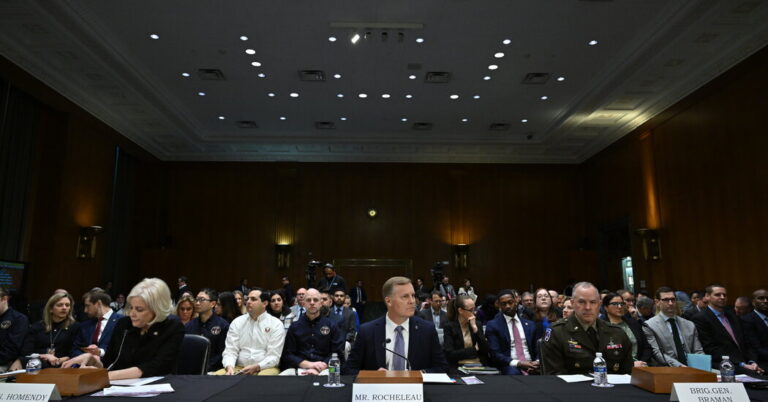Here is the text in plain format:
At the United States Agency for International Development, thousands of workers have been fired or put on administrative leave and many of its projects addressing global issues like health, hunger and education have been halted.
Now, a former Goldman Sachs analyst and son of a private equity billionaire has ambitions to control some of U.S.A.I.D.’s roughly $40 billion budget and apply more of a “pro-market” approach to supporting development in other countries.
Benjamin Black, 40, has been nominated by President Trump to run the U.S. International Development Finance Corporation, a little-known agency that invests and lends billions each year to companies and projects overseas.
Mr. Black, whose father is Leon Black, a co-founder of the private equity firm Apollo Global Management, has said he wants the development finance agency to be able to use money that previously went to U.S.A.I.D. for international projects that explicitly benefit American interests.
“If we are going to spend money abroad, let’s do so with an investment-driven model,” Benjamin Black and the tech entrepreneur Joe Lonsdale wrote in an essay last month, about two weeks before Mr. Trump’s inauguration.
Their essay, which appeared on Mr. Lonsdale’s blog, said U.S.A.I.D. had experienced “absurd mission drift” and was funneling money into unnecessary projects that promoted gender equity and green energy. Bloomberg reported earlier on the essay.
But Mr. Black argued that the United States should be focused on projects that delivered a clear return for Americans. For example, he wants the development agency to be at the forefront of developing infrastructure and mining projects in Greenland, the ice-covered island that Mr. Trump says he wants to control.
Less than two months into Mr. Trump’s efforts to overhaul the federal government, it is not clear what will become of U.S.A.I.D.’s annual appropriations, which are controlled by Congress. Elon Musk, the world’s richest man and Mr. Trump’s cost-cutter in chief, has called U.S.A.I.D. a “criminal organization” that should be put out of business.
Leon Black, the elder, has been dogged by his associations with Jeffrey Epstein, the disgraced financier. Mr. Black stepped down as chairman of the private equity firm in 2021 because of the controversy over his personal ties to Mr. Epstein and the disclosure that he had paid Mr. Epstein hefty fees for tax and estate planning.
Arthur Schwartz, a spokesman for Mr. Black, declined to comment for this article. A White House spokesman did not respond to a request for comment.
In filling government jobs, Mr. Trump has often turned to wealthy individuals from finance, real estate, and technology. But several people familiar with the process said Mr. Black’s nomination had come as something of a surprise given his limited foreign policy and legislative experience.
Mr. Black has law and business degrees from Harvard and a master’s in taxation from New York University School of Law. He was associated with the Council on Foreign Relations for five years and was an associate at Apollo for two years after his stint at Goldman Sachs.
Mr. Lonsdale, a co-founder of Palantir Technologies, a big data analytical software company, did not return requests for comment. Mr. Lonsdale, who also founded the venture firm 8VC and a new college, the University of Austin in Texas, is an adviser to Mr. Musk in his federal cost-cutting role and was tied to a pro-Trump super PAC.
The younger Mr. Black’s connections to the investment world could also bolster the development agency’s attempts to attract private equity firms, hedge funds, and international investors to participate in deals initiated by the agency. Some larger deals are backed by a combination of equity investments and loans from the agency and banks.
Leon Black, 73, who is worth more than $13 billion and is a world-renowned art collector, is a well-known figure on Wall Street. He and Mr. Trump have known each other for decades.
One of its more notable projects during the Biden administration was providing a $553 million loan to a railroad project in Angola. In 2023, the agency lent $125 million to a shipyard near Athens to allow it to transport natural gas around Europe, in a bid to move Europe away from its dependence on Russian oil.
Under the first Trump administration, the agency worked with Mr. Trump’s elder daughter, Ivanka, to push for projects aimed at lending to female-owned businesses. The agency extended a $92 million loan to help banks in Honduras lend to small businesses.
Source link




